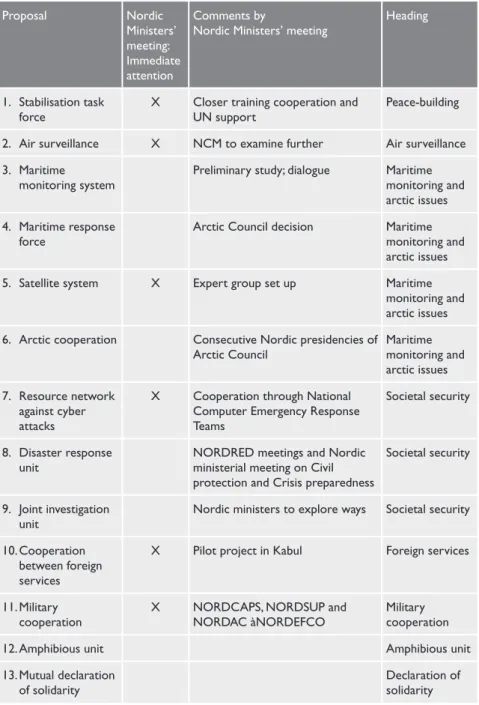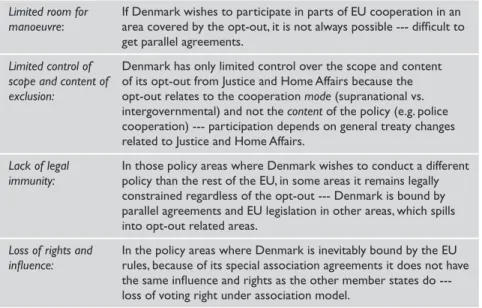Until the crisis, the G20 - the world's twenty leading economies - had been exclusively a forum for finance ministers. It is not in Denmark's interest, nor in the world's interest.
DENMARK AND ITS PARTNERS
Two things in particular determined developments in Afghanistan in 2009: .. the new US approach to Afghanistan, and the much-criticized Afghan presidential election in August. The working group falls under 'The Contact Group on Piracy off the Coast of Somalia', which was established in January 2009 at the request of the UN Security Council.
INTRODUCTION
A Nordic monitoring and early warning system should be established in Nordic maritime areas. The increase in traffic is seen as a particular challenge for the resources of the Nordic countries individually.
SOME NORDIC RESPONSES
The chairman of the defense committee of the Finnish parliament agreed that the declaration of solidarity caused difficulties for Finland. His remarks were critical of the creation of the National Defense Agency and instead pointed to the coast guard as the key agency in Iceland's response to the report:

TWO VISIONS
The Norwegian defense ministry's reaction to Stoltenberg's proposals appears to have been more reserved than that of their foreign ministry colleagues. In the minister's annual keynote address to the Oslo Military Society given in January 2010, there was no mention of Stoltenberg's proposals or Nordic cooperation.
SOME CONCLUSIONS
Nevertheless, small steps rather than grandiose plans have been the preference of the Nordic countries when they have acted together in the past. Denmark's absence from some of the activities will not mean that it acts as a spoiler, but it will be a reminder that Denmark's path in defense and security matters may take it away from its Nordic neighbours.
Federspiel, Ulrik (2008), 'The International Situation and Danish Foreign Policy 2007', in Nanna Hvidt and Hans Mouritzen (eds.), Danish Foreign Policy Yearbook 2008, Copenhagen: Danish Institute for International Studies: 13-29. Larsen, Henrik (2007), 'The cartoon crisis in Danish foreign policy: A new balance between the EU and the US?', in Nanna Hvidt and Hans Mouritzen (eds.), Danish Foreign Policy Yearbook 2007, Copenhagen: Danish Institute for International Studies: 51-85.
THE INTERNATIONAL FINANCIAL CRISIS
The article first provides a brief overview of the financial crisis as it developed internationally and in Denmark. Finally, the article briefly discusses some issues related to the wider effects of the financial crisis on the international system.
AN OVERVIEW
In the following week, this action failed to calm fears of a bankruptcy in the weak eurozone countries and there was speculation that the financial turmoil would be followed by a panic-simi-. The financing collected for the loans will be guaranteed by the eurozone countries and by other EU countries that have voluntarily participated in the guarantees.
THE DANISH FINANCIAL CRISIS
This made it possible to avoid a situation where the Danish financial regulator would be obliged under Danish law to intervene to enforce changes in the management of the pension institutions. At the end of 2008, there were reports of increasing losses in the Danish banking sector.
INTERNATIONAL CAUSES BEHIND THE FINANCIAL CRISIS
Japan – has caused an accumulation of savings that has been plowed back into the US economy mainly through investments in government bonds, causing a general reduction in the level of interest rates in the US. In Denmark, the banks' financing of real estate has been maintained through a large capital inflow, which is influenced by financing that Danish banks have raised on the international wholesale financial markets.
CROSS-BORDER EFFECTS FROM SUPPORT OF FINANCIAL INSTITUTIONS
Thus, measures that support lending by keeping financial companies alive also work in favor of foreign residents, as they also maintain their credit supply. State intervention to support financial firms in difficulty gives the national financial sector a competitive advantage.
INTERNATIONAL FACTORS BEHIND SUPPORT OF FINANCIAL INSTITUTIONS
In light of these various factors, which would speak against government intervention in support of financial institutions, the decision by policy makers to intervene and the massive scale of the intervention is surprising. However, a number of purely domestic factors, several of them political, probably played a larger role in the decision of policy makers to intervene in support of financial institutions.
THE BEHAVIOUR OF POLICY MAKERS
Finally, as a further political reason behind the decision of policy makers to intervene during the financial crisis, one can point to the short-term benefits that can be derived from such an intervention. By intervening in financial markets, governments can obtain short-term political benefits through an ability to act, while the costs in terms of higher public debt and a less efficient economic system only show in the longer term.
THE INTERNATIONAL EXPERIENCE
Swedish Finance Minister Anders Borg said: "If all countries solve problems separately, one country's solution will be another country's problem."7 National guarantee schemes were introduced in flagrant violation of state aid rules set by the EU. Policy leaders have also said that failure to intervene to support Greece could lead to the collapse of the eurozone.
THE DANISH EXPERIENCE
The Danish authorities were among the first to participate in the competition to raise funding. In the Greek bailout, the Danish government voluntarily acted as guarantor for part of the loans made available to the eurozone countries.
WHY HAS INTERNATIONAL COORDINATION PREVAILED?
Since the Danish contribution makes little difference to the overall size of the overall package, the decision can be seen as another indication that European policymakers are increasingly acting not only to maximize the interests of their national constituencies, but also with a view to optimizing non-important interests. -national interests. As a final explanation for the fact that national governments pursue a policy of international coordination, we can point to the influence of the financial sectors.
SYSTEMIC EFFECTS OF THE FINANCIAL CRISIS
The financial crisis has undoubtedly weakened support for free capital flows, which have been a key element in the 'Washington Consensus' and thus the world economic order since the early 1990s. In conclusion, based on the experience of the current crisis, it is too early to predict the collapse of the open world economic order.
CONCLUSION
The new prime minister believed much more in the power of the free market and in managing the environment through economic instruments. The Ministry of Environment was given the role of negotiating under the United Nations Framework Convention on Climate Change (UNFCCC), but the final decisions, according to the logic of the organization, would be taken in the secretariat led by the Prime Minister. The minister's office.
HOPE – AND CRISIS
TWO TRACKS
In early 2009, the Prime Minister's Office decided that a new, more politically focused strategy was needed to deliver a successful result in December, if necessary, to bypass the UNFCCC process. The Prime Minister's office, backed by the Ministry of Finance, had little confidence in the UNFCCC process or the UNFCCC office in Bonn, Germany, led by Executive Director Yvo de Boer.
A HECTIC AUTUMN
Despite warnings from the UNFCCC office in Bonn and strong opposition from experts in the Ministry of Climate and Energy, this strategy was followed. Second, it created a path to a political solution which meant that heads of state would actively participate in the negotiations in Copenhagen.
OPEN CONFLICT
The second was the fact that the text we showed was not closely coordinated with what was on the table during the negotiations. In the first weekend of December, the Prime Minister organized a meeting for a small group of 20-30 countries in Copenhagen.
THE DANISH TEXT
During the meeting, the US announced that Barack Obama would participate in the high-level COP session and not, as planned, simply land in Copenhagen during the first week of the COP on his way to Oslo to receive the Nobel Prize. Peace Prize. Most of the poorest nations were not prepared to support a weak outcome, but preferred that Copenhagen fail if the rich countries would not legally commit to emission reductions at the level recommended by the science.
THE JEWEL IN THE CROWN
The jewel in the crown of the Danish strategy, which was prepared during years of intense diplomatic efforts, did not see the light of day. Formal negotiations were still taking place in working groups, which showed little progress under Hedegaard's leadership.
SHOWDOWN IN ROOM 21
Late in the afternoon he lost his temper and left the room saying, "I want to see Wen". This was partly because there could not actually be an agreement, as the agreement had to be discussed and adopted in plenary first, and partly because the Danish government naturally expected to be one of the announcing parties.
BELOW OUR MODEST EXPECTATIONS
Symbolically, the opt-out plays a big role for large parts of the Danish population as a kind of guarantee of sovereignty in the light of European integration. The basic logic of the opt-out is that Denmark is 'out' where cooperation is supranational, but 'in'.
AN EXEMPTION WITH EXEMPTIONS
So, when it comes to different forms of legal harmonization – or common rules – the opt-out leaves Denmark with a freedom of choice that no other member states have – the Danish government and parliament (Folketinget) can copy the EU rules they want and simply ignore the rest. It is therefore mainly with regard to the harmonization of asylum legislation and legal immigration, especially family reunification, that Denmark has gradually taken a different political course than the rest of the EU.
THE BLURRED DISTINCTION BETWEEN AUTONOMY AND PARTICIPATION
This question relates to the unique legal model and anatomy of the waiver protocol. While cooperation on Justice and Home Affairs has been growing, so has the Danish choice.

CONCLUSION AND THE FUTURE
Statement by the Danish Minister for Foreign Affairs, Per Stig Møller, at the tenth session of the United Nations Human Rights Council, Geneva, 3 March 2009. Speech by the Danish Minister for Foreign Affairs, Per Stig Møller, at the sixth ministerial meeting of the Arctic Council, Tromsø, 29 April 2009.
SECURITY ISSUES IN AFRICA
We – the member states of the United Nations – must therefore work together to ensure that the Human Rights Council serves as the intended central platform for the promotion and protection of human rights and fundamental freedoms. We must strengthen – not weaken – the Special Procedures and their mandates in the service of promoting and protecting human rights.
THE ARCTIC
In the Arctic, we are already suffering disproportionately from the impacts of climate change and need to adapt to the changes. As Arctic countries, we have a common responsibility to ensure that the international community is made aware of the impacts of climate change in the Arctic.
THE FINANCIAL CRISIS
Of course, this means reforming the mandates, scope, responsibilities and governance within the IMF and the World Bank, as stated by the Group of Twenty in London. To ensure that gender equality and women's empowerment are high on the international agenda is one of the overall objectives of the campaign.
VISIONS FOR COP15
We now need to resolve a number of key political issues that still remain unresolved: Questions related to the commitment of developed countries to ambitious medium-term reduction targets. Questions related to the commitment of developing countries to pursue national action to reduce the growth of their emissions.